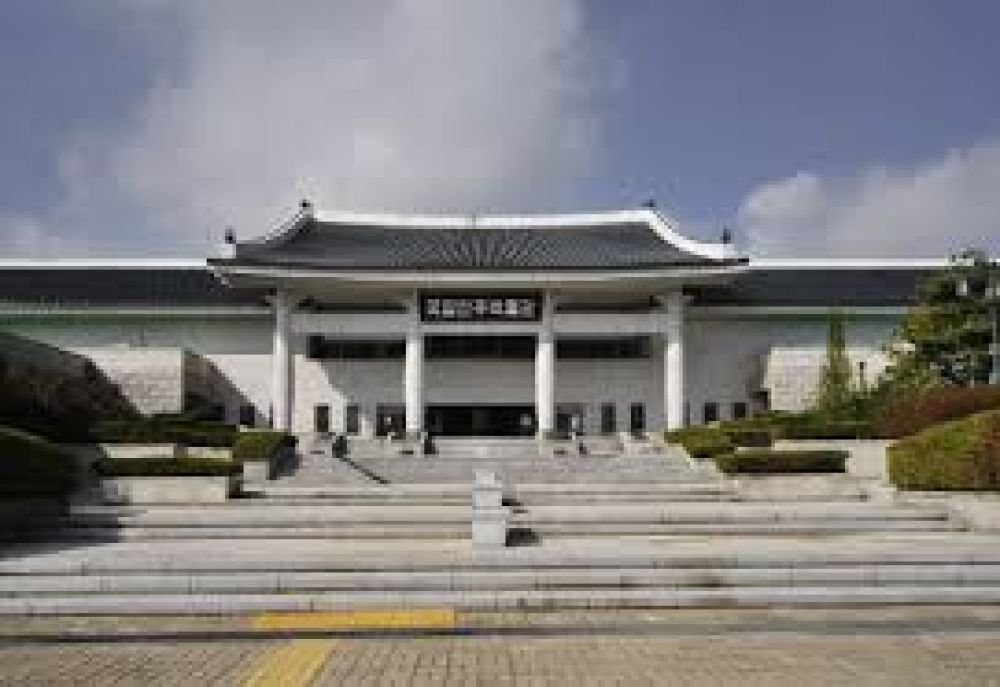Food History of Jeonju National Museum, Jeonju, South Korea
The Jeonju National Museum, while primarily focused on preserving and exhibiting cultural artifacts and relics of the region, is situated in a city known for its rich culinary heritage. Jeonju has been designated a Creative City for Gastronomy by UNESCO. This recognition is due in large part to its long-standing food traditions and its efforts in preserving and promoting Korean cuisine, particularly dishes that originated from the Joseon Dynasty.
Furthermore, Jeonju is the birthplace of one of Korea's most renowned dishes, bibimbap, which is a mixed rice dish with vegetables and, traditionally, beef, although it can be made without meat for a vegetarian option. While the museum itself does not focus on food, its location in Jeonju places it at the heart of a city deeply connected to the traditional Korean gastronomy, thus offering visitors an opportunity to engage with the local food culture through various culinary experiences in Jeonju.
Must-Try Top 10 Food Dishes in Jeonju National Museum, Jeonju, South Korea
- Bibimbap (Vegetarian option available) - A mixed rice dish with seasoned vegetables, gochujang (chili pepper paste), and usually a fried egg on top.
- Kongnamul Gukbap (Vegetarian option available) - A savory bean sprout soup with rice, typically served with seafood or pork, but can be made vegetarian without meat.
- Jeonju Choco Pie (Vegetarian) - A popular Korean snack, similar to a chocolate-coated cake with a marshmallow filling.
- Pajeon (Vegetarian) - A Korean savory pancake made with green onions and seafood or other meats, though vegetarian versions omit these.
- Mugwort Rice Cake (Vegetarian) - Known as Ssuk-Beomul, a traditional Korean rice cake made from mugwort and glutinous rice.
- Beansprouts and Rice (Vegetarian) - Served as a side dish or a meal, with seasoned beansprouts over rice.
- Kimchi (Vegetarian option available) - Fermented vegetables, traditionally made with cabbage and radish, famous for its health benefits and spicy, tangy flavor.
- Jeonju Hanjeongsik (Vegetarian option available) - A traditional Korean set meal with an array of side dishes.
- Yukgaejang (Without beef option) - A spicy soup with vegetables, egg strips, and traditionally beef, but can be enjoyed without for a vegetarian version.
- Kimchi Fried Rice (Vegetarian option available) - A popular dish made with kimchi and rice, often with added vegetables and sometimes seafood or other meats.
Top Famous Restaurants in Jeonju National Museum, Jeonju, South Korea
- Hanok Village Restaurants
-
Address: Jeonju Hanok Village
Famous for: Authentic Jeonju Bibimbap (Vegetarian option available)
- Gaekridan-gil Street Eateries
-
Address: Gyo-dong, Jeonju
Famous for: Street food and Snacks (Variety of vegetarian options)
- Veteran (베테랑)
-
Address: 19, Eojin-gil, Wansan-gu, Jeonju
Famous for: Kalguksu (Handmade chopped noodles) and Measured Noodles (Vegetarian options can be requested)
- Taejo Gamjatang
-
Address: 34-5 Pungnammun 2-gil, Wansan-gu, Jeonju
Famous for: Potato Pork Backbone Stew (Non-vegetarian), with the possible exclusion of pork for a vegetarian option
- Jeonjuhyanggyo Bibimbap
-
Address: 145-1 Gyo-dong, Wansan-gu, Jeonju
Famous for: Traditional Jeonju Bibimbap (Vegetarian option available)
- Namunae
-
Address: 63-3 Hanji-gil, Wansan-gu, Jeonju
Famous for: Innovative Korean Cuisine (Offers vegetarian dishes)
When visiting Jeonju and the Jeonju National Museum, exploring the culinary landscape is as much a cultural experience as viewing the historical exhibits. Whether you prefer vegetarian or seafood options, Jeonju's vibrant food scene has something to offer everyone.

